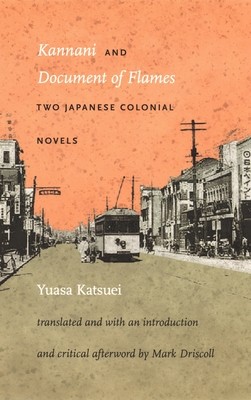
- We will send in 10–14 business days.
- Author: Katsuei Yuasa
- Publisher: Duke University Press
- ISBN-10: 0822335174
- ISBN-13: 9780822335177
- Format: 15.3 x 23.3 x 1.3 cm, softcover
- Language: English
- SAVE -10% with code: EXTRA
Reviews
Description
This volume makes available for the first time in English two of the most important novels of Japanese colonialism: Yuasa Katsuei's Kannani and Document of Flames. Born in Japan in 1910 and raised in Korea, Yuasa was an eyewitness to the ravages of the Japanese occupation. In both of the novels presented here, he is clearly critical of Japanese imperialism. Kannani (1934) stands alone within Japanese literature in its graphic depictions of the racism and poverty endured by the colonized Koreans. Document of Flames (1935) brings issues of class and gender into sharp focus. It tells the story of Tokiko, a divorced woman displaced from her Japanese home who finds herself forced to work as a prostitute in Korea to support herself and her child. Tokiko eventually becomes a landowner and oppressor of the Koreans she lives amongst, a transformation suggesting that the struggle against oppression often ends up replicating the structure of domination.
In his introduction, Mark Driscoll provides a nuanced and engaging discussion of Yuasa's life and work and of the cultural politics of Japanese colonialism. He describes Yuasa's sharp turn, in the years following the publication of Kannani and Document of Flames, toward support for Japanese nationalism and the assimilation of Koreans into Japanese culture. This abrupt ideological reversal has made Yuasa's early writing-initially censored for its anticolonialism-all the more controversial. In a masterful concluding essay, Driscoll connects these novels to larger theoretical issues, demonstrating how a deep understanding of Japanese imperialism challenges prevailing accounts of postcolonialism.
EXTRA 10 % discount with code: EXTRA
The promotion ends in 17d.17:27:11
The discount code is valid when purchasing from 10 €. Discounts do not stack.
- Author: Katsuei Yuasa
- Publisher: Duke University Press
- ISBN-10: 0822335174
- ISBN-13: 9780822335177
- Format: 15.3 x 23.3 x 1.3 cm, softcover
- Language: English English
This volume makes available for the first time in English two of the most important novels of Japanese colonialism: Yuasa Katsuei's Kannani and Document of Flames. Born in Japan in 1910 and raised in Korea, Yuasa was an eyewitness to the ravages of the Japanese occupation. In both of the novels presented here, he is clearly critical of Japanese imperialism. Kannani (1934) stands alone within Japanese literature in its graphic depictions of the racism and poverty endured by the colonized Koreans. Document of Flames (1935) brings issues of class and gender into sharp focus. It tells the story of Tokiko, a divorced woman displaced from her Japanese home who finds herself forced to work as a prostitute in Korea to support herself and her child. Tokiko eventually becomes a landowner and oppressor of the Koreans she lives amongst, a transformation suggesting that the struggle against oppression often ends up replicating the structure of domination.
In his introduction, Mark Driscoll provides a nuanced and engaging discussion of Yuasa's life and work and of the cultural politics of Japanese colonialism. He describes Yuasa's sharp turn, in the years following the publication of Kannani and Document of Flames, toward support for Japanese nationalism and the assimilation of Koreans into Japanese culture. This abrupt ideological reversal has made Yuasa's early writing-initially censored for its anticolonialism-all the more controversial. In a masterful concluding essay, Driscoll connects these novels to larger theoretical issues, demonstrating how a deep understanding of Japanese imperialism challenges prevailing accounts of postcolonialism.


Reviews